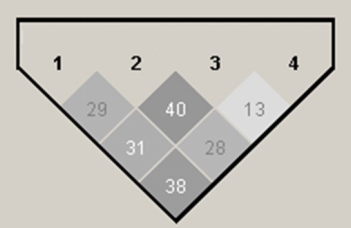IRF5 variants and rheumatoid arthritis susceptibility in women from Central Mexico
DOI:
https://doi.org/10.17305/bb.2025.12919Keywords:
IRF5, variants, risk, inflammatory, RAAbstract
Rheumatoid arthritis (RA) is a chronic autoimmune disease in which dysregulated interferon regulatory factor 5 (IRF5) may amplify pro-inflammatory pathways; prior genetic studies of IRF5 single-nucleotide variants (SNVs) in RA are inconsistent across populations and have not included mestizo Mexicans or evaluated rs59110799 in RA. We aimed to test whether four IRF5 SNVs (rs2004640G/T, rs2070197T/C, rs10954213G/A, rs59110799G/T) confer susceptibility to RA in women from Central Mexico. In a case–control study of 239 women with RA and 231 female controls (all self-identified Mexican-Mestizos, ≥3 generations), genotyping was performed by real-time PCR with TaqMan® probes; 80% of samples were duplicated (100% concordance) and control genotypes conformed to Hardy–Weinberg equilibrium. Association was assessed under allelic and multiple genetic models using logistic regression adjusted for age and birthplace, with Bonferroni correction for 23 tests (α=0.0022). Haplotype and linkage disequilibrium (LD) were analyzed with Haploview; putative functional effects were explored in silico (SNPinfo; GTEx). The minor alleles rs2004640T [OR=1.69, 95% CI 1.29–2.21; p=1.2×10⁻⁴], rs2070197C [OR=1.85, 1.39–2.46; p=2.0×10⁻⁵], and rs10954213A [OR=1.47, 1.12–1.93; p=0.002] were associated with increased RA risk after correction. Genotype-based associations were observed for rs2004640 (codominant and recessive) and rs2070197 (codominant, dominant, recessive). rs59110799G/T showed no significant association after correction (dominant model OR=1.69, 1.15–2.48; p=0.007). Nine haplotypes were identified; the haplotype carrying all four risk alleles (TCAT) was not associated, and two haplotypes with nominal signals (GCAG, TTGT) had control frequencies <1% and were excluded; variants were not in strong LD (r²<0.80). Our findings—providing the first evaluation of these IRF5 variants in Mexican women and the first report of rs59110799 in RA—support a role for IRF5 (rs2004640, rs2070197, rs10954213) in RA susceptibility in this Latin American population. Given the female-only design and moderate statistical power, replication and functional studies are warranted.
Citations
Downloads

Downloads
Published
Issue
Section
Categories
License
Copyright (c) 2025 Isaac Alberto López-Briceño, Guillermo Valencia-Pacheco, Isela Montúfar-Robles, Usman Zeb, Rosa Elda Barbosa-Cobos, Julian Ramírez-Bello

This work is licensed under a Creative Commons Attribution 4.0 International License.









